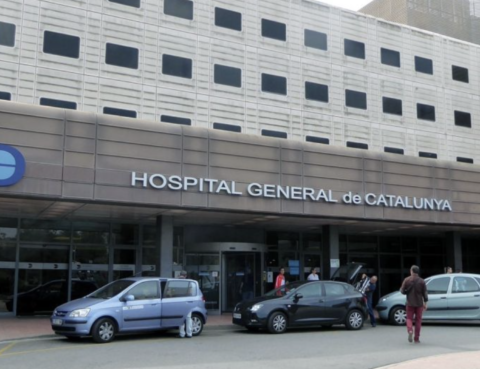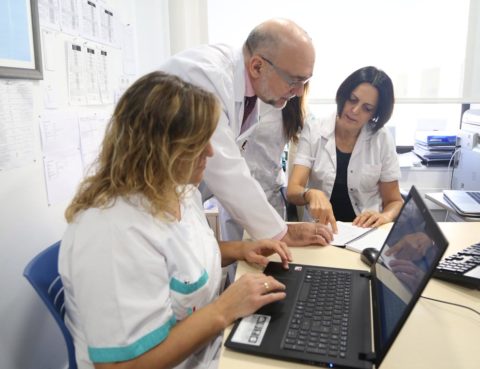NEWS

On Epiphany, the U.S. Food and Drug Administration approved a new drug for early-stage Alzheimer’s disease or for patients with mild cognitive impairment. This drug, lecanemab, moderately slows the rate of cognitive decline in a way that is noticeable to patients.
The Hospital Universitari General de Catalunya, through the Clinical Research Unit (UDIC) led by Dr. Ernest Balaguer, has participated in the phase 2 and phase 3 trial of this drug. In both we have patients who have been receiving the medication openly for years.
Lecanemab is marketed under the name Leqembi and has been developed by the companies Esai and Biogen. In the third phase of clinical trials, it was observed that the drug achieved a 27% slowdown in cognitive decline after 18 months.
Leqembi eliminates insoluble aggregates of beta-amyloid protein, patients who received this treatment recorded a significant reduction in beta-amyloid plaque, as demonstrated by amyloid PET. The accumulation of amyloid beta in the brain is a precursor of Alzheimer’s disease.

The Hospital Universitari General de Catalunya, through the Clinical Research Unit (UDIC), has included the world’s first patient in a phase I clinical trial in Alzheimer’s disease called Brainshuttle AD, code BP42155, from Roche. The study evaluates the safety and tolerance at different doses of an antiamyloid monoclonal antibody (gantenerumab) with a module that acts as a shuttle that allows it to cross the blood-brain barrier and release it in the brain.
This could improve the efficacy and safety of this line of products that are being evaluated to try to modify the progressive course of mild to moderate or prodromal Alzheimer’s disease. In the first part of the study, a dose of the drug (RO7126209) or placebo is administered by intravenous infusion to obtain all the safety variables.
The Hospital Universitari General de Catalunya, an international reference center in Alzheimer’s studies led by Dr. Ernest Balaguer, neurologist and research director, has participated from the beginning as an advisor and the name of the trial was assigned by this hospital after a debate between the different participating research centers. The meaning is brain shuttle in Alzheimer’s disease.
The treatment was carried out with the collaboration of all the professionals of the trial unit (neurologists, nurses, coordinators) and of the professionals of the Hospital’s Intensive Care Unit (intensive care physicians, nurses and clinical assistants).
One of the main obstacles in the development of new treatments is their ability to cross the blood-brain barrier and reach the brain (since due to the large size), unlike the drugs used in these therapies to date (only a small amount reaches of the administered drug). Brain Shuttle is an innovative project that proposes a solution to the difficulty of access of drugs to the interior of the central nervous system. It is a technology developed by Roche to increase the penetration of large molecules, such as antibodies, into the brain.
Large molecule access to the brain is restricted by the blood-brain barrier (BBB), a gatekeeper between blood and brain tissue that carefully filters which molecules can enter the brain. Using Roche’s Antibody Engineering Platform, antibodies are created that can cross the blood-brain barrier by binding to one of the protein receptors located on its surface. The so-called “brain shuttle” technology could potentially transport all kinds of therapeutic molecules to the brain, regardless of their intrinsic ability to cross the blood-brain barrier

The Hospital Universitari General de Catalunya, which was the first center in Spain activated for the phase I trial in Parkinson’s (REASON) with which it is intended to modify the natural progression of the disease, continues to include new patients, after having been the one that included to the first patient in Spain.
The research consists of administering by injection intrathecally – a fluid-filled space between the thin layers of tissues that cover the brain and spinal cord – of a dose of an antisense oligonucleotide, which avoids the signal that activates a gene called LRRK2, known as “the Basque mutation” or Parkin 8, with the idea of inhibiting the formation of the alpha-synuclein protein.
Parkinson’s disease, a neurodegenerative disorder of unknown cause, which produces tremor at rest, slowness of movement and rigidity, is caused by a deficiency of dopamine at the level of the basal ganglia and is characterized by the presence of this abnormal protein that is the alpha-synuclein.
The main objective of this study is to evaluate the safety and tolerability of single and multiple doses of BIIB094 to participants with Parkinson’s disease. The secondary objective is to evaluate the pharmacokinetic (PK) profile of BIIB094. The study is open for patients with Parkinson’s disease with verified presence or absence of mutations in the leucine-rich repeat kinase 2 (LRRK2) gene, but also for patients without any verified disease-related gene mutation since it is postulated that this gene will also be overexpressed in all Parkinson’s patients and not just the LRRK2 mutants. In the latter patients the progression of the disease would be prevented while in the former it could be avoided.
For Ernest Balaguer, director of research at the HUGC and head of the Clinical Research Unit (UDIC), it is a very innovative approach to try to modify the natural history of Parkinson’s, both for patients who have this “Basque mutation” and for those who they do not have it, and it could prevent the progression of the disease. ”
At the Hospital Universitari General de Catalunya, several lines of research are developed through the UDIC, led by Dr. Ernest Balaguer. It should be noted that all anti-Parkinson drugs authorized in the last 20 years have been evaluated.

The main purpose of this study is to evaluate the safety and tolerability of single and multiple doses of BIIB094 to participants with Parkinson’s disease.
The General University Hospital of Catalonia is the first center in Spain that has been activated for a new and particular phase I trial in Parkinson’s (REASON), which seeks to cure the disease. The trial, which has already begun in the USA, involves the administration of an intrathecal injection – fluid-filled space between the thin layers of tissue covering the brain and spinal cord – with a dose of an antisense oligonucleotide, which avoids the signal that activates a gene called LRRK2, known as “the Basque mutation” or Parkina 8, with the idea of inhibiting the formation of the alpha-synuclein protein.
Parkinson’s disease, a neurodegenerative disorder of unknown cause, which causes resting tremor, slowness of movement and stiffness, is caused by a dopamine deficiency at the basal ganglia and is characterized by the presence of this anomalous protein that is the alpha-synuclein.
This is a brilliant experiment to try to modify the natural evolution of parkinson’s.
The main purpose of this study is to evaluate the safety and tolerability of single and multiple doses of BIIB094 to participants with Parkinson’s disease. The secondary objective is to evaluate the pharmacokinetic (PK) profile of BIIB094. The study is open to patients with Parkinson’s disease with verified presence or absence of mutations in the leucine-rich repeat kinase 2 gene (LRRK2), but also for patients without any verified genetic mutations related to the disease as it is postulated that this gene will also be over-expressed in all patients with Parkinson’s and not only the LRRK2 mutants. In the latter patients the progression of the disease would be avoided while in the former it could be avoided.
For Ernest Balaguer, director of research at the HUGC and head of the Clinical Research Unit (UDIC), this is a “brilliant experiment to try to modify the natural evolution of parkinson’s, both for patients who have this” basque mutation “and those who they do not have it, and it could prevent the progression of the disease. “The clinical trial appears on www.clinicaltrials.gov and will soon appear the General University Hospital of Catalonia, as well as on the Michel J Fox Foundation Trial Finder.
The Hospital develops several lines of research through the UDIC, led by Dr. Ernest Balaguer. It is noteworthy that of the last seven anti-Parkinson’s drugs that have been marketed in Spain, all of them have been evaluated at the General Hospital, because they have a great experience in these drugs

We have reached the first position, in December 2019, in the international inclusion of patients in the trial with sublingual apomorphine and motor blocks in Parkinson.
We are also leading the national inclusion of patients in the Clarity AD trial (monoclonal anti-amyloid antibody in early Alzheimer)
Finally, in the Graduate trial (monoclonal subcutaneous in Alzheimer) we are the second recruitment site in our country.

On October 22, 2019, Biogen announced the positive result of its EMERGE clinical trial (in which the UDIC has participated) that has evaluated Aducanumab (an anti-alpha synuclein monoclonal antibody) in early Alzheimer’s disease. Efficacy in slowing cognitive impairment was demonstrated (measured with the CDR-SB, MMSE, ADAS-cog and ADCS-ADL scales) and a reduction in amyloid load detected in PET (almost 80%). The most frequent side effects were cerebral edema (asymptomatic and transient, in general, detected in brain MRI) and headache.These data suport the amyloid hypothesis in this disease and a change in its diagnostic and therapeutic paradigm.

